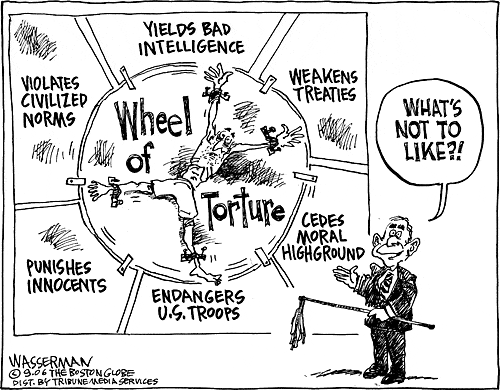Wednesday, September 20, 2006
The Guardian: European watchdog calls for clampdown on CIA

European watchdog calls for clampdown on CIA · UK is urged to take lead in monitoring agents · Scathing attack on Bush, 'the King John of USA' Nicholas Watt in Brussels and Suzanne Goldenberg in Washington Friday September 8, 2006 The Guardian The head of Europe's human rights watchdog yesterday called for monitoring of CIA agents operating in Britain and other European countries, after President George Bush's admission that the US had detained terrorist suspects in secret prisons. Terry Davis, secretary general of the Council of Europe, said CIA agents operating in Europe should be subject to the same rules as British agents working for MI5 and MI6. "There is a need to deal with the conduct of allied foreign security services agents active on the territory of a council member state," Terry Davis said. "In the UK there is parliamentary scrutiny of the intelligence services but there is no parliamentary scrutiny of friendly foreign services. The UK should be in the lead on this issue." As part of this process, diplomatic immunity should be reviewed. "Immunity should not mean impunity," he said. Mr Davis also called for a ban on the transport of suspects in military aircraft. At the moment the prohibition applies only to civil aircraft. The former British Labour MP was scathing about President Bush. "Why does the US need to keep people in secret prisons? I thought that was settled by Magna Carta. But King John is alive and well and running the USA. "There is a smoking gun. We know where it is - it is in the hands of George Bush. His fingerprints are on the gun." Mr Davis's remarks came as the man leading the Council of Europe's investigation into the secret CIA prisons dismissed Mr Bush's admission as "just one piece of the truth". In an attempt to step up pressure on the US and European governments to come clean on the prisons, the Swiss senator Dick Marty said: "There is more, much more, to be revealed." Mr Bush said on Wednesday he ordered the transfer of 14 al-Qaida suspects from secret CIA jails to Guantánamo as a step to putting the men on trial. That revived concerns about torture and mistreatment of the detainees during their years in CIA custody, and the fairness of the military tribunals sought by the White House. Human rights activists expect details of the treatment of Khalid Sheikh Mohammed, said to have been the mastermind of the September 11 attacks, and the other al-Qaida suspects held incommunicado will emerge now that they are at Guantánamo and able to meet their lawyers. Administration officials said yesterday that Condoleezza Rice, the secretary of state, had assured the International Committee of the Red Cross it would have access to the prisoners and that discussions were under way to arrange meetings. However, the administration also said yesterday it had no intention of satisfying European demands for fuller disclosure about the location of the secret prisons. "If the European countries want to continue to try to find out where the secret sites are, that is up to the Europeans," John Bellinger III, legal adviser to Ms Rice, told reporters. He also argued, as has Ms Rice, that Europeans were to some extent complicit with the clandestine detention. "Information derived from questioning individuals was shared with European countries, and it was shared in a way that saved European lives." Washington also wants to use such secret jails in the future, Mr Bellinger said. "The president believes there needs to be a special programme if we capture an al-Qaida leader." Mr Marty said he was not surprised by Mr Bush's disclosures. "This is no news for me," said Mr Marty, who claimed earlier this year that 14 European countries colluded with US intelligence in a "spider's web" of human rights abuses. "I have always been certain that these prisons existed, so I am not surprised." Other senior figures in the Council of Europe, who plan to intensify their investigations into allegations that Romania and Poland played host to many of the prisoners, also criticised the US. Rene van der Linden, president of the Council of Europe's parliamentary assembly, said: "Our work has helped to flush out the dirty nature of this secret war which, we learn at last, has been carried out completely beyond any legal framework. "Kidnapping people and torturing them in secret, however tempting the short-term gain may appear to be, is what criminals do, not democratic governments. In the long term, such practices create more terrorists and undermine the values we are fighting for." Special reports Guantánamo Bay Al-Qaida United States Full text June 2006 US supreme court ruling on Guantánamo trials (pdf) Detention in Afghanistan and Guantánamo Bay: statement by Shafiq Rasul, Asif Iqbal and Rhuhel Ahmed (pdf) Read the letter from Moazzam Begg (pdf) Useful links Lawyers Committee for Human Rights Centre for Constitutional Rights Office of Military Commissions |